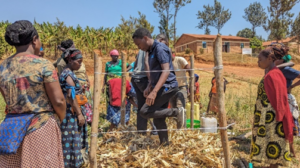Nurturing Resilience: Sustainable Agriculture in Comoros and Rwanda
In the fight against climate change and the pursuit of sustainable agriculture, two groundbreaking collaborative initiatives in Comoros and Rwanda exemplify the power of knowledge, collaboration, and innovation in transforming agricultural practices and enhancing community resilience.
The undeniable sensitivity of agriculture to climate change—with impacts ranging from soil erosion and drought to heat stress in livestock—underscores a global imperative: to adapt agricultural practices in response to changing climatic conditions, ensuring food security and economic stability. In this context, the work of these two Leveraging Innovations in New Communities (LINC) Grant initiatives provide vital insights into the transformative potential of sustainable agriculture, demonstrating localized responses to these universal challenges.
Innovative Onion Farming Transformation in Comoros
In the picturesque but vulnerable archipelago of Comoros, two 2021 Fellows, Aincha Aboubakar and Abdallah Mabrouck, harnessed their expertise and the support of a LINC Grant to address these very challenges. Their initiative aimed to revolutionize onion farming—a staple crop for local livelihoods—through the introduction of the “Airflow Onion Storage Technology (AOST).” This technology promised not just enhanced crop storage and reduced waste but also a beacon of sustainable agricultural practice in the region.

During a concentrated two-week period that bridged the end of July and beginning of August 2023, Aincha and Abdallah engaged with 50 local farmers, imparting advanced cultivation and storage techniques pivotal for both economic resilience and environmental sustainability. Their efforts culminated in the construction of a model AOST facility, illustrating the tangible benefits of their innovative approach.
Beyond immediate training, the project’s legacy includes establishing a network of knowledge and support, connecting farmers with key stakeholders, including the Permanent Secretary for the Comoros Ministry of Agriculture, a Representative of the World Bank in Comoros, HE the Ambassador of Tanzania in Comoros, and members of the YALI alumni network; thus, embedding the seeds of sustainable growth within the community.

Empowering Rwanda’s Women Through Organic Farming

Parallel to the endeavors in Comoros, Rwanda witnessed a similar groundbreaking initiative led by Fernando Bamba, a 2022 Alumnus from the Democratic Republic of Congo, and Patrick Mugiraneza, a 2017 Alumnus from Rwanda.
Focusing on the empowerment of women farmers in Eastern Rwanda, their project tackled critical aspects of organic farming—from production techniques to market access and certification challenges.
Their 4-day workshop at the tail-end of July 2023 trained 35 participants—30 of whom were women—also equipped the farmers with the tools needed to disseminate this knowledge within their communities, potentially impacting over 600 farmers.

This transfer of knowledge is critical in a region where organic farming can significantly mitigate climate impacts, enhance food security, and elevate economic prospects. The alumni duo envision the project as a catalyst for establishing cross-border business partnerships between women farmers in the DRC and Rwanda, boosting international trade for smallholders and expanding economic prospects for these women.
Toward a Sustainable and Resilient Agricultural Future
Looking ahead, Aincha and Abdallah plan to ensure the sustainable growth of their project by providing specialized training for extension officers, the professionals responsible for disseminating agricultural information and technologies to farmers. The creation of demonstration plots will allow farmers to observe and learn new farming techniques and innovative practices. Furthermore, value addition training will empower farmers to enhance the value of their agricultural products through processing, packaging, and marketing.
Reflecting on the potential impact of the collaboration, Fernando said, “Extending climate-responsible agricultural practices by making smallholder farmers involved is the best way of contributing to building sustainable and resilient rural communities in Sub-Saharan Africa.”
The initiatives in Comoros and Rwanda epitomize a proactive approach to the multifaceted challenges of climate change in agriculture. By integrating innovative techniques with community empowerment, these projects not only address immediate needs but also lay the groundwork for enduring change, aligning with global efforts to adapt and thrive in a changing climate.
Extending climate-responsible agricultural practices by making smallholder farmers involved is the best way of contributing to building sustainable and resilient rural communities in Sub-Saharan Africa.”
Fernando Bamba, 2022 Fellowship Alumnus, Democratic Republic of Congo
Such endeavors resonate profoundly with the global narrative of agricultural adaptation, illustrating that with ingenuity, collaboration, and targeted action, communities can cultivate resilience and prosperity, even in the face of daunting environmental challenges. These groundbreaking efforts transcend mere agriculture; they embody empowerment, self-reliance, and the enduring advancement of Africa’s climate-conscious agricultural sector.
Written by Karagania Mwamlole.